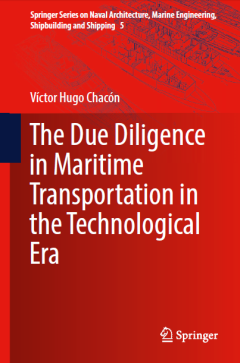Ditapis dengan

The due diligence in maritime transportation in the technological era
- Edisi
- -
- ISBN/ISSN
- 978-3-319-66002-8
- Deskripsi Fisik
- -
- Judul Seri
- -
- No. Panggil
- TXT MR Cha t
- Edisi
- -
- ISBN/ISSN
- 978-3-319-66002-8
- Deskripsi Fisik
- -
- Judul Seri
- -
- No. Panggil
- TXT MR Cha t

Evaluation of cold ironing and speed reduction policies to reduce ship emissi…
Different port operating policies have the potential to reduce emissions from shipping; however, their efficacy varies for different ports. This article extends existing literature to present a consistent and transferable methodology that examines emissions reduction port policies based on ship-call data. Carbon dioxide (CO2); sulphur dioxide (SO2); nitrogen oxides (NOx); and black carbon (BC) …
- Edisi
- Vol. 16, 4, 371–398
- ISBN/ISSN
- -
- Deskripsi Fisik
- 2008
- Judul Seri
- -
- No. Panggil
- ATC MR WAS e

Challenges in the maritime-land interface : maritime freight and logistics
As the containerization of the global economy reaches a phase of maturity and rationalization, ports find themselves embedded in ever changing commercial environment where logistics is at the forefront. The global market place, with powerful and footloose players, extensive business networks within complex logistics systems, have a dramatic impact on the raison d'être of seaports. The new logi…
- Edisi
- -
- ISBN/ISSN
- -
- Deskripsi Fisik
- 29 p.
- Judul Seri
- -
- No. Panggil
- ATC MR NOT c

Maritime Transportation Research: Topics and Methodologies
The purpose of this paper is to review and analyze maritime transportation academic research. For articles published in Maritime Policy & Management (MPM) in the period 2001 to 2012, the most frequent topics addressed include shipping performance/ management and shipping finance. For articles published in Maritime Economics & Logistics (MEL) in the period 2002 to 2012, the most frequent top…
- Edisi
- Vol. 40, No. 7
- ISBN/ISSN
- 1464-5254
- Deskripsi Fisik
- 18 p
- Judul Seri
- Maritime Policy & Management: The flagship journal of international shipping and port research
- No. Panggil
- ATC MR TAL m
 Karya Umum
Karya Umum  Filsafat
Filsafat  Agama
Agama  Ilmu-ilmu Sosial
Ilmu-ilmu Sosial  Bahasa
Bahasa  Ilmu-ilmu Murni
Ilmu-ilmu Murni  Ilmu-ilmu Terapan
Ilmu-ilmu Terapan  Kesenian, Hiburan, dan Olahraga
Kesenian, Hiburan, dan Olahraga  Kesusastraan
Kesusastraan  Geografi dan Sejarah
Geografi dan Sejarah